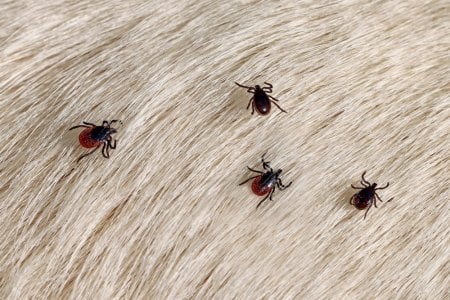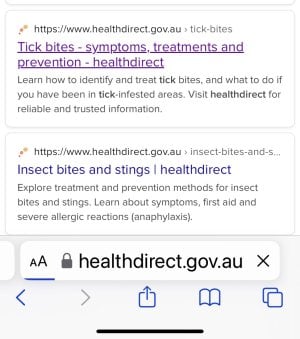Protect Your Brain: The Deadly New Tick Virus Doctors Just Discovered for the First Time!
By
Seia Ibanez
- Replies 11
As we enjoy the great outdoors, it's important to be aware of the less pleasant aspects of nature, such as ticks. These tiny creatures can carry diseases that pose serious health risks, and recently, doctors have detected a new tick-borne virus that's raising alarms worldwide.
The virus, known as the wetland virus (WELV), has been identified in humans for the first time, and it's proving to be a formidable foe due to its ability to trigger severe brain infections. The first known case was reported in a man from China who is believed to have contracted the virus after a tick bite during a visit to a park in Mongolia.

This discovery adds WELV to a growing list of diseases transmitted by ticks, which includes the likes of Lyme disease and malaria. The 61-year-old patient initially presented with symptoms such as fever, headache, vomiting, and poor appetite, which led to him being treated with antibiotics. However, when his condition didn't improve, doctors realized they were dealing with a viral infection, not a bacterial one.
Blood tests revealed the presence of a previously unknown orthonairovirus, a category of viruses often transmitted by ticks. One of the more notorious orthonairoviruses is Crimean-Congo haemorrhagic fever (CCHF), which can be fatal in up to 40% of cases. Like CCHF, WELV can be contracted through contact with infected livestock or, potentially, from human to human via bodily fluids.
In a sweeping study, researchers collected around 14,600 ticks across Northern China and found that five different tick species could carry WELV, with the Haemaphysalis concinna tick being the most common carrier. Further investigation into hospital patients who had developed fevers after tick bites revealed that 20 individuals were infected with the virus.
The symptoms of WELV infection include dizziness, headaches, back pain, nausea, and diarrhea. More alarmingly, the virus can cause tissue damage and blood clotting issues. In one severe case, a patient entered a coma and exhibited high levels of white blood cells around the brain and spinal cord, indicating a serious infection. Fortunately, all patients in the study recovered after treatment and were discharged within four to 15 days.
Lab experiments on mice have shown that WELV can cause severe and often fatal infections, affecting multiple organs, including the brain and nervous system. This suggests that while the virus may be mild in some cases, it could lead to more severe health issues in more vulnerable patients.
The researchers, who published their findings in the New England Journal of Medicine, emphasized the importance of improving surveillance and detection for emerging orthonairoviruses. This will enhance our understanding of the impact these viruses have on human health and help us develop strategies to combat them.
For our members, especially those who enjoy spending time in nature, it's crucial to take precautions against tick bites. The NHS recommends a four-step routine to safely spot and remove ticks. If you find a tick on your skin, it's essential to remove it promptly to reduce the risk of infection.
Stay vigilant and protect yourself by wearing long sleeves and pants when in wooded or grassy areas, using insect repellents that contain DEET, and performing regular tick checks after outdoor activities. If you experience any unusual symptoms following a tick bite, seek medical attention immediately.

We encourage our readers to share their experiences and tips for staying tick-free in the comments below. Let's keep each other informed and safe as we enjoy the beauty of Australia's natural landscapes.
The virus, known as the wetland virus (WELV), has been identified in humans for the first time, and it's proving to be a formidable foe due to its ability to trigger severe brain infections. The first known case was reported in a man from China who is believed to have contracted the virus after a tick bite during a visit to a park in Mongolia.

Doctors have detected a tick-borne virus that can trigger deadly brain infections. Credit: Shutterstock
This discovery adds WELV to a growing list of diseases transmitted by ticks, which includes the likes of Lyme disease and malaria. The 61-year-old patient initially presented with symptoms such as fever, headache, vomiting, and poor appetite, which led to him being treated with antibiotics. However, when his condition didn't improve, doctors realized they were dealing with a viral infection, not a bacterial one.
Blood tests revealed the presence of a previously unknown orthonairovirus, a category of viruses often transmitted by ticks. One of the more notorious orthonairoviruses is Crimean-Congo haemorrhagic fever (CCHF), which can be fatal in up to 40% of cases. Like CCHF, WELV can be contracted through contact with infected livestock or, potentially, from human to human via bodily fluids.
In a sweeping study, researchers collected around 14,600 ticks across Northern China and found that five different tick species could carry WELV, with the Haemaphysalis concinna tick being the most common carrier. Further investigation into hospital patients who had developed fevers after tick bites revealed that 20 individuals were infected with the virus.
The symptoms of WELV infection include dizziness, headaches, back pain, nausea, and diarrhea. More alarmingly, the virus can cause tissue damage and blood clotting issues. In one severe case, a patient entered a coma and exhibited high levels of white blood cells around the brain and spinal cord, indicating a serious infection. Fortunately, all patients in the study recovered after treatment and were discharged within four to 15 days.
Lab experiments on mice have shown that WELV can cause severe and often fatal infections, affecting multiple organs, including the brain and nervous system. This suggests that while the virus may be mild in some cases, it could lead to more severe health issues in more vulnerable patients.
The researchers, who published their findings in the New England Journal of Medicine, emphasized the importance of improving surveillance and detection for emerging orthonairoviruses. This will enhance our understanding of the impact these viruses have on human health and help us develop strategies to combat them.
For our members, especially those who enjoy spending time in nature, it's crucial to take precautions against tick bites. The NHS recommends a four-step routine to safely spot and remove ticks. If you find a tick on your skin, it's essential to remove it promptly to reduce the risk of infection.
Stay vigilant and protect yourself by wearing long sleeves and pants when in wooded or grassy areas, using insect repellents that contain DEET, and performing regular tick checks after outdoor activities. If you experience any unusual symptoms following a tick bite, seek medical attention immediately.
Key Takeaways
- Doctors have detected the first known case of a new deadly tick-borne virus known as wetland virus (WELV), which can cause severe brain infections.
- The virus was identified in a 61-year-old man from China who had been bitten by ticks during a visit to a park in Mongolia, and it has since been found to infect nearly two dozen people.
- WELV is spread by ticks and farm animals and has the potential to be fatal, with symptoms ranging from fever and headaches to severe neurological damage.
- Research indicates that WELV can lead to serious health issues in vulnerable patients, and improved surveillance and detection are necessary to understand the impact of such emerging viruses on human health.
We encourage our readers to share their experiences and tips for staying tick-free in the comments below. Let's keep each other informed and safe as we enjoy the beauty of Australia's natural landscapes.








